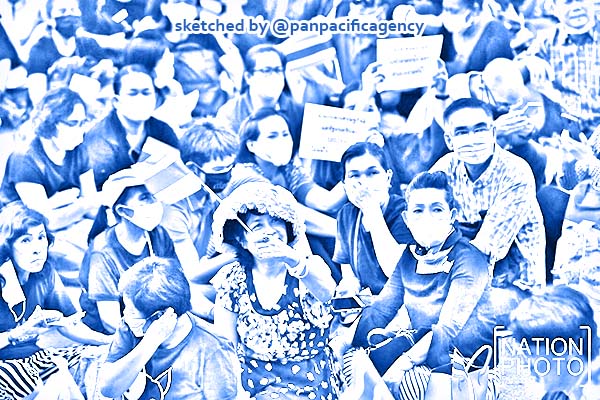Coronavirus pandemic increases Thai political risks: Fitch Solutions

Thousands of students and people attend a political rally at Kasetsart University (Thailand) on Saturday, demanding a rewriting of the Constitution and promising more protests to make their case. Photo: The Nation. Sketched by the Pan Pacific Agency.
BANGKOK, Apr 30, 2020, BT. Thailand faces growing political risks as the Covid-19 pandemic continues to exact an economic toll, said a Fitch Solutions Country Risk and Industry Research report on Apr 29, The Business Times reported.
The blow dealt by the pandemic to Thailand’s large tourism sector, which accounts for about 22 per cent of gross domestic product (GDP), poses risks to social stability as the tourism and travel sector accounts for one in six jobs. Apart from travel restrictions, a state of emergency and provincial lockdowns have also been imposed to control the spread of the virus.
“Uncertainty over when restrictions would be lifted has further fuelled disgruntlement amongst voters, angered by the impact of the containment measures on their livelihoods and the perceived slow reaction to the outbreak by the government,” said the report.
The report writers do not expect a return of the widespread protests seen in 2014, but believe that voter discontent could test the unity of the current coalition government.
Both rising unemployment and food price inflation could hurt social stability. Thailand’s official unemployment rate does not capture its large informal sector, which is heavily exposed to the collapse in tourism.
While the government has introduced a large fiscal stimulus package of about 9 per cent of GDP, “the intended recipients of this support have complained at delays in receiving handouts during the lockdown period”.
“As such, there are risks to social instability in the near term, with the government likely to have to provide social support for affected households and businesses into 2021,” said the report.
Thailand’s economic recovery ultimately depends on a rebound in external demand, including the resumption of global travel and tourism, but this may be hard to come by as governments keep cautious.
Given these near-term threats to social stability and external relations, Fitch Solutions Country Risk and Industry Research has lowered Thailand’s Short-Term Political Risk Index score to 68.3 out of 100, from 70.4 previously.
In the longer term, there is also the risk of worsening international trade relations with countries such as the United States, with Thailand having a current account surplus of 7 per cent of GDP in 2019 and being at risk of going onto the US’ currency manipulator watch-list.
In a separate Apr 30 report, DBS said that Thailand is likely to be among the Asean-6 countries that are hit worst by the Covid-9 pandemic, with the full-year growth figure expected to be the worst since 1998’s 7.6 per cent contraction.
While a resumption of activity in China could aid Thailand’s manufacturing and export sector from late Q2 onwards, other key markets remain under water, said the report. Domestic sentiment has been depressed, with fiscal support “expected to buoy consumption in the immediate term but … hard to sustain”.
Assuming that normalcy returns from Q3 onwards, DBS forecasts -5.5 per cent growth for 2020. But high uncertainty lends a downside risk of 1 to 1.5 percentage points to this estimate.